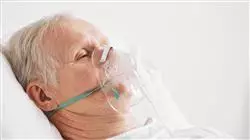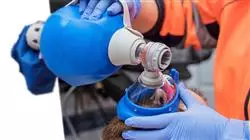University certificate
The world's largest faculty of medicine”
Introduction to the Program
The Postgraduate certificate in Ventilatory Parameters in NIMV will allow you to explore the latest developments in pressure, volume, flow, and Ti/Ttot adjustment”

Ventilatory parameters play a crucial role in the application of NIMV, providing valuable information about the interaction between the patient and the ventilator that helps optimize ventilation and ensure the individual's comfort. As a result, recent scientific research has focused on finding cutting-edge techniques for their adjustment, which streamlines the recovery process for patients with different respiratory conditions. Therefore, staying up-to-date in this area is essential for pulmonologists who wish to remain at the professional forefront.
That is why TECH has designed this Postgraduate certificate, through which the physician will receive an excellent update on Ventilatory Parameters in NIMV. Over 150 hours of intensive study, they will identify the recent recommendations regarding the adjustment of pressure, volume, flow, Ti/Ttot, as well as trigger management. Additionally, they will delve into patient-ventilator synchronization and cutting-edge strategies for addressing alarms.
All of this, using an innovative 100% online methodology that allows the student to complete their update without having to give up their daily personal and professional commitments. Likewise, they will have access to top-notch educational content available in modern formats such as explanatory videos, interactive summaries, or real case simulations. Thanks to this, they will enjoy dynamic and highly effective learning.
Learn, throughout this academic experience, the state-of-the-art mechanisms to carry out the management of alarms in Non-Invasive Mechanical Ventilation"
This Postgraduate certificate in Ventilatory Parameters in NIMV contains the most complete and up-to-date scientific program on the market. The most important features include:
- The development of case studies presented by experts in Non-Invasive Mechanical Ventilation
- The graphic, schematic, and practical contents with which they are created, provide scientific and practical information on the disciplines that are essential for professional practice
- Practical exercises where self-assessment can be used to improve learning
- Its special emphasis on innovative methodologies
- Theoretical lessons, questions to the expert, debate forums on controversial topics, and individual reflection assignments
- Content that is accessible from any fixed or portable device with an Internet connection
Do you want to update yourself remotely and without having to give up your daily obligations? This Postgraduate certificate is designed for you!”
The program’s teaching staff includes professionals from the field who contribute their work experience to this educational program, as well as renowned specialists from leading societies and prestigious universities.
The multimedia content, developed with the latest educational technology, will provide the professional with situated and contextual learning, i.e., a simulated environment that will provide immersive education programmed to learn in real situations.
This program is designed around Problem-Based Learning, whereby the professional must try to solve the different professional practice situations that arise during the academic year For this purpose, the students will be assisted by an innovative interactive video system created by renowned and experienced experts.
Position yourself as a cutting-edge pulmonologist in just 6 week and enjoying the best study facilities in the educational environment"

Thanks to this program, you will review the latest indications and contraindications of NIMV in Chronic, Acute Hypoxemic and Global Respiratory Failure"
Why study at TECH?
TECH is the world’s largest online university. With an impressive catalog of more than 14,000 university programs available in 11 languages, it is positioned as a leader in employability, with a 99% job placement rate. In addition, it relies on an enormous faculty of more than 6,000 professors of the highest international renown.

Study at the world's largest online university and guarantee your professional success. The future starts at TECH”
The world’s best online university according to FORBES
The prestigious Forbes magazine, specialized in business and finance, has highlighted TECH as “the world's best online university” This is what they have recently stated in an article in their digital edition in which they echo the success story of this institution, “thanks to the academic offer it provides, the selection of its teaching staff, and an innovative learning method aimed at educating the professionals of the future”
A revolutionary study method, a cutting-edge faculty and a practical focus: the key to TECH's success.
The most complete study plans on the university scene
TECH offers the most complete study plans on the university scene, with syllabuses that cover fundamental concepts and, at the same time, the main scientific advances in their specific scientific areas. In addition, these programs are continuously being updated to guarantee students the academic vanguard and the most in-demand professional skills. In this way, the university's qualifications provide its graduates with a significant advantage to propel their careers to success.
TECH offers the most comprehensive and intensive study plans on the current university scene.
A world-class teaching staff
TECH's teaching staff is made up of more than 6,000 professors with the highest international recognition. Professors, researchers and top executives of multinational companies, including Isaiah Covington, performance coach of the Boston Celtics; Magda Romanska, principal investigator at Harvard MetaLAB; Ignacio Wistumba, chairman of the department of translational molecular pathology at MD Anderson Cancer Center; and D.W. Pine, creative director of TIME magazine, among others.
Internationally renowned experts, specialized in different branches of Health, Technology, Communication and Business, form part of the TECH faculty.
A unique learning method
TECH is the first university to use Relearning in all its programs. It is the best online learning methodology, accredited with international teaching quality certifications, provided by prestigious educational agencies. In addition, this disruptive educational model is complemented with the “Case Method”, thereby setting up a unique online teaching strategy. Innovative teaching resources are also implemented, including detailed videos, infographics and interactive summaries.
TECH combines Relearning and the Case Method in all its university programs to guarantee excellent theoretical and practical learning, studying whenever and wherever you want.
The world's largest online university
TECH is the world’s largest online university. We are the largest educational institution, with the best and widest online educational catalog, one hundred percent online and covering the vast majority of areas of knowledge. We offer a large selection of our own degrees and accredited online undergraduate and postgraduate degrees. In total, more than 14,000 university degrees, in eleven different languages, make us the largest educational largest in the world.
TECH has the world's most extensive catalog of academic and official programs, available in more than 11 languages.
Google Premier Partner
The American technology giant has awarded TECH the Google Google Premier Partner badge. This award, which is only available to 3% of the world's companies, highlights the efficient, flexible and tailored experience that this university provides to students. The recognition as a Google Premier Partner not only accredits the maximum rigor, performance and investment in TECH's digital infrastructures, but also places this university as one of the world's leading technology companies.
Google has positioned TECH in the top 3% of the world's most important technology companies by awarding it its Google Premier Partner badge.
The official online university of the NBA
TECH is the official online university of the NBA. Thanks to our agreement with the biggest league in basketball, we offer our students exclusive university programs, as well as a wide variety of educational resources focused on the business of the league and other areas of the sports industry. Each program is made up of a uniquely designed syllabus and features exceptional guest hosts: professionals with a distinguished sports background who will offer their expertise on the most relevant topics.
TECH has been selected by the NBA, the world's top basketball league, as its official online university.
The top-rated university by its students
Students have positioned TECH as the world's top-rated university on the main review websites, with a highest rating of 4.9 out of 5, obtained from more than 1,000 reviews. These results consolidate TECH as the benchmark university institution at an international level, reflecting the excellence and positive impact of its educational model.” reflecting the excellence and positive impact of its educational model.”
TECH is the world’s top-rated university by its students.
Leaders in employability
TECH has managed to become the leading university in employability. 99% of its students obtain jobs in the academic field they have studied, within one year of completing any of the university's programs. A similar number achieve immediate career enhancement. All this thanks to a study methodology that bases its effectiveness on the acquisition of practical skills, which are absolutely necessary for professional development.
99% of TECH graduates find a job within a year of completing their studies.
Postgraduate Certificate in Ventilatory Parameters in NIMV
Current developments and research regarding all types of respiratory conditions have triggered advances in mechanical ventilation, even more so when Covid-19 arrives in 2020. Against this backdrop, specialists must be trained to the highest level to deal with the most complex respiratory conditions in a contemporary and modern way. This TECH Postgraduate Certificate in Ventilatory Parameters in NIV, in addition to deepening the technological developments, provides the specialist with the most vigorous discoveries in the pathophysiology of respiratory failure, as well as its clinical diagnosis and prevailing imaging tests. The program is designed for healthcare professionals, such as physicians, nurses and respiratory therapists, who wish to expand their knowledge related to non-invasive mechanical ventilation in their daily clinical practices. During the Postgraduate Certificate, participants will learn the basic fundamentals of non-invasive mechanical ventilation, including the different types of devices used in intensive care. In addition, the program includes the teaching of ventilatory parameters, such as pressure, volume and respiratory rate, which are key to the maintenance of proper ventilatory balance.
Study 100% online from anywhere
TECH is ranked by Forbes as the best digital university in the world due to its extensive experience that includes ten thousand university degrees in ten different languages, and has a staff of specialised and world-renowned teachers. Postgraduate Certificate in Ventilatory Parameters in NIV will be able to perform comprehensive patient assessments, set appropriate ventilation parameters and pay constant attention to clinical data to ensure safe and effective administration of this specialised technique. The entire educational cycle is delivered online so that more students worldwide have access to it. In conclusion, the Postgraduate Certificate in Ventilatory Parameters in NIV is an excellent academic training option for healthcare professionals who wish to update and expand their skills in the management of non-invasive mechanical ventilation.







